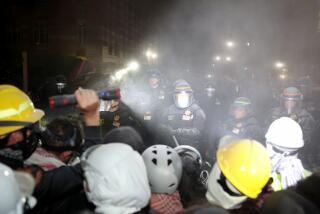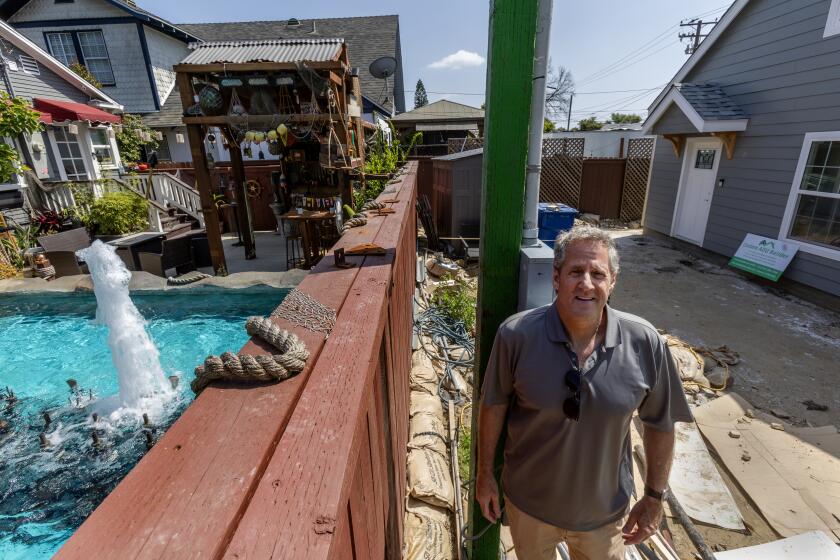LAPD Chief Bratton: We’ve changed
WHEN I BECAME chief of police 3 1/2 years ago, I promised the people of Los Angeles that the LAPD would do three things: reduce crime, protect the city from terrorists and reform the character and style of our policing.
Owing in large part to the extraordinary efforts of our officers, we have reduced crime every year since then. Today, Los Angeles, on a per capita basis, is the nation’s second-safest large city. In the last year, serious crime has fallen to its lowest point since 1956, while arrests have steadily increased. With the assistance of the mayor and the City Council, the Los Angeles Police Department also has broadened and deepened its capacity to prevent terrorism.
It is not enough, however, to drive down crime and to interdict terrorist threats. The police must do so consistently, compassionately and constitutionally. We have made tremendous strides in our quest to reform this department’s culture, policies and practices, and the work is ongoing. This process has been driven largely by the consent decree the city worked out with the U.S. Department of Justice in 2001, a year and a half before I was appointed chief.
Some people have recommended that the entire decree be extended by two years — beyond the June 15 expiration date — saying that the LAPD is unwilling or unable to adhere to its reform agenda.
This is just plain wrong. As we are struggling to become more open, the pundits appear to have become more myopic. Let me set the record straight.
The men and women of the LAPD largely have embraced the tenets of the consent decree, realizing that many of its requirements formalized findings of an earlier, internal process and have greatly improved the organization. The vast majority of the reforms are now part and parcel of LAPD policy.
This is a new LAPD. Fully one-third of our officers have been hired since the consent decree was implemented in 2001, and more than two-thirds have joined the department since 1995, when the Justice Department began its investigation. So, a significant percentage of our officers accept these “new” practices as normal operating procedure. Among the changes: watch commander review of arrestees and booking charges, stringent selection standards for anti-gang and field training officers and creation of a specialized division to investigate uses of force.
The reform process has become an ongoing conversation involving the police, city leaders, the federal monitor and the judge. In most areas, particularly those involving the investigation and resolution of citizen complaints, the department, the civilian Police Commission and its inspector general and our federal partners have agreed that real reform is taking place.
The LAPD is now recognized worldwide as a leader in “best practices policing.” We are regularly asked to provide advice on topics such as police performance auditing, ethical decision-making and supervisory training. In terms of the investigation of police shootings — down to half what they were in 1995 — the LAPD’s review and investigation procedures are widely considered to be state-of-the-art. The department continually reinforces its commitment to transparency of operations by maintaining an ongoing dialogue with community and civil rights groups and by posting all audits, monitor reports and Police Commission findings on our website (www.lapdonline.org).
We are committed to completing TEAMS II, a computerized system for tracking officers’ disciplinary records, which will serve as a prototype for similar systems throughout the country. Its scale and ambition have presented formidable technical challenges. However, the pace is reflective of the careful consideration that has gone into the process and does not represent a failure or lack of willingness to implement reform. The LAPD also seeks to outfit every patrol car with a video camera in order to provide an objective view of our transactions with the public and to promote a sense of openness and cooperation with the community.
The LAPD has learned from the past and is ready to take on the mantle of accountability the community expects of its police department. We are committed to openness, dialogue and best policing practices aimed at making Los Angeles the safest large city in the nation.
More to Read
Start your day right
Sign up for Essential California for news, features and recommendations from the L.A. Times and beyond in your inbox six days a week.
You may occasionally receive promotional content from the Los Angeles Times.






